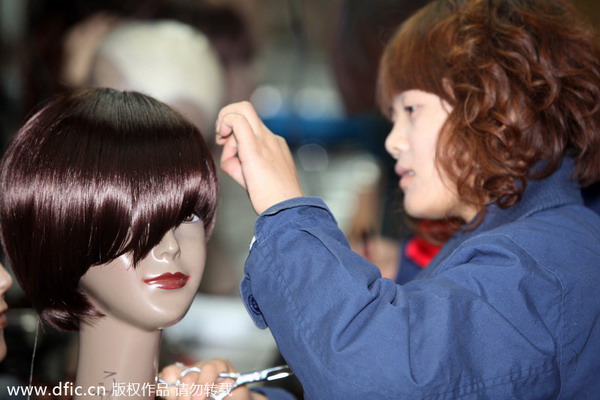 |
|
Stylist makes a wig at China's Henan Rebecca Hair Products Co Ltd. [Photo / IC] |
Chinese wigmaker banks on fashion to reap continued rewards in Africa
In Africa, it can be a significant part of everyday life and as a result, represents a not insignificant part of the local fashion industry.
The world's largest wig producers have recognized this, and numerous factories have been set up by international investors.
Like any part of the fashion sector, wig styles come and go, and Wang Junqi, the general manager of Rebecca Fashion Ltd in Nigeria, says China can offer the women of Africa the very latest.
Henan Rebecca Hair Products Co Ltd became the first hair products company to list on the Shanghai Stock Exchange in 2003.
It now has subsidiaries in London, Chicago and in Nigeria's biggest city, Lagos, and justifiably claims to be one of the world's top wig makers.
"We have research teams specifically focusing on Europe, the United States, and, of course, the African market.
"There is no clear African leader in this market, so we have to carry out our own research on what's doing well in the industry. We have to observe the market and produce all the wig styles ourselves.
"Our research teams come here to investigate the market numerous times a year, and thanks to their efforts, we are leading the trends in Africa and many local companies are actually following us," he says.
Wang adds that designing a wig is like designing any other fashion product: It needs exhaustive market research.
Rebecca researchers spend time with local hair stylists or hair salons to observe local trends.
Sometimes they even go to remote villages to check demand from different types of people, says Wang.
But feedback from European and US markets also is a crucial indicator for local fashions because many African consumers still have a strong interest in pursing Western trends, or following Western celebrity styles.
"For instance, we have had a large demand in Nigeria to produce the styles worn by Rihanna, the Barbadian recording artist, actress and fashion designer," Wang says.
"So we have to provide at least 2,000 different designs every year.
"But clearly that's too big for the general market to consume, so we select the best 10 to 20 designs every month and then adjust our numbers based on market reaction.
Whether rich or poor, a wig is considered a necessity in many African women's daily lives, but price and demand depend on the individual.
"Based on our research, the average African woman changes her wig every five days or once in a week, but in some circumstances, that can be every month," Wang says.
"So our prices vary depending on quality and style."
Rebecca's Nigerian products range in price between 200 local naira ($1.23) to more than a couple of hundred thousand, but the most popular products cost between 1,000 and 2,000 naira.
"Apart from the normal market, we also have high-end products," Wang says. "Many rich consumers demand a private shopping environment and tailored styles, so we also have six high-end salons in Nigeria."
He says a completely hand-woven, real-hair wig can cost more than 100,000 naira.
Launched in 1995 in Xuchang, Henan province, Rebecca's initial ambitions were domestic, but the business grew fast and it started looking overseas, opening in Nigeria in 1999 to become the first Chinese wig producer on the continent.
"It wasn't until 2005 that another Chinese competitor came here, and now there are 40 Chinese wig companies registered in Nigeria alone, leading to the creation of the Chinese Wig Companies Association in 2009, of which Rebecca is the current president," Wang says.
